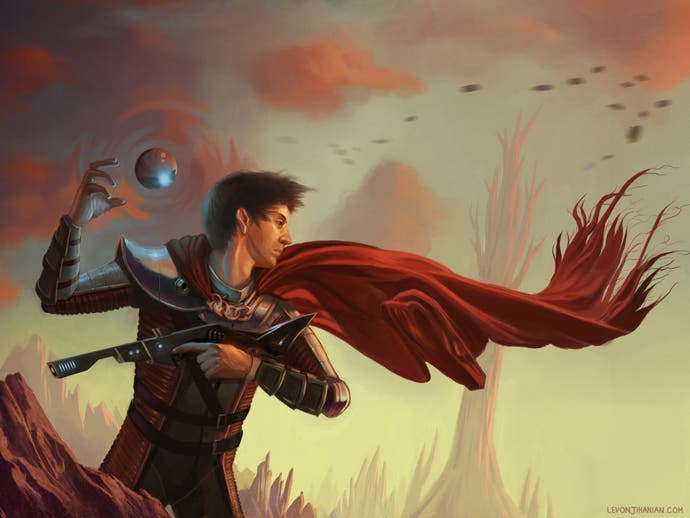Torment's $3.5m Kickstarter stretch goal is Obsidian's Chris Avellone
Plus, a sackful of extra detail from the team's Ask Me Anything on Reddit.
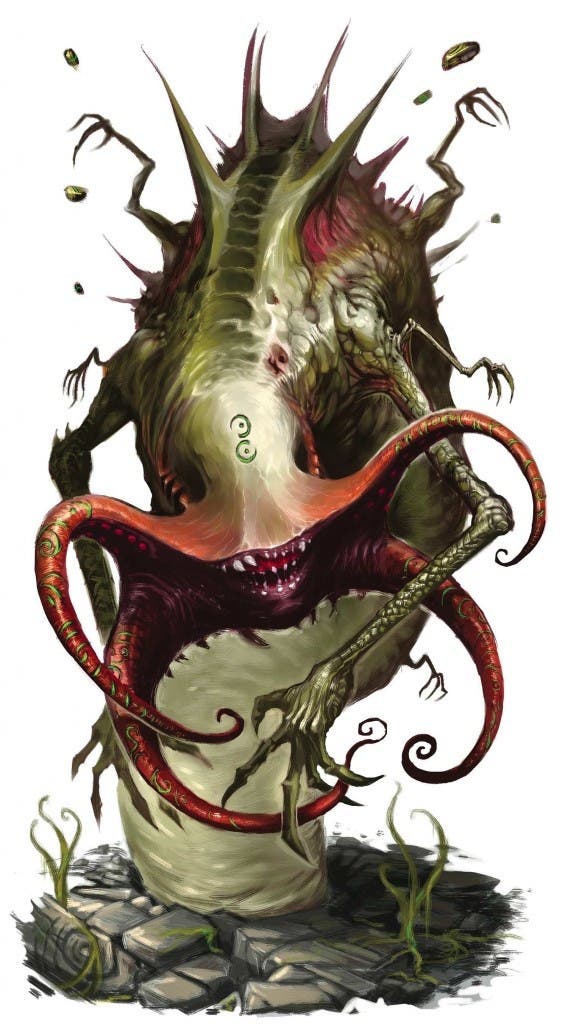
Chris Avellone was the lead designer of Planescape: Torment, his number-two was Colin McComb. Colin McComb is the lead designer of Torment: Tides of Numenera, that thematic successor to PST that's absolutely flying on Kickstarter.
Torment: Tides of Numenera is being built by inXile Entertainment, the studio founded by Brian Fargo - he who was boss of PST publisher Interplay once upon a time. Chris Avellone is a founding officer of Obsidian Entertainment, the studio made up of loads of old Black Isle staff - as in, the studio that made Planescape: Torment.
InXile and Obsidian are so friendly with each other that Chris Avellone is helping Brian Fargo make Wasteland 2, an inXile production.
What a long introduction.
What I'm trying to say is that while Colin McComb and Brian Fargo and Adam Heine - and all the other people on the Torment: Tides of Numenera team - are the perfect people to bring Torment back, it would be even perfecter if Chris Avellone joined in.
Well now he very nearly is! Chris Avellone is the $3.5 million stretch goal for Torment: Tides of Numenera.
"He'll have two primary roles," the Torment Kickstarter updated explained. "First, he will be reviewing and providing feedback on all creative elements of the game, including the story, characters, and areas. His input will be invaluable as a resource to Colin in further detailing the creative vision for the game.
"Second, he'll be designing and writing an eighth companion for the game, working with Colin and Monte [Cook - creator of Numenera] to craft a companion ideal for both Torment and the Ninth World."
Torment: Tides of Numenera has raised just over $2.85 million at the time of writing. There are 14 days of Kickstarter crowdfunding to go.
"You build your character with a sentence ... I am an adjective noun who verbs"
Colin McComb
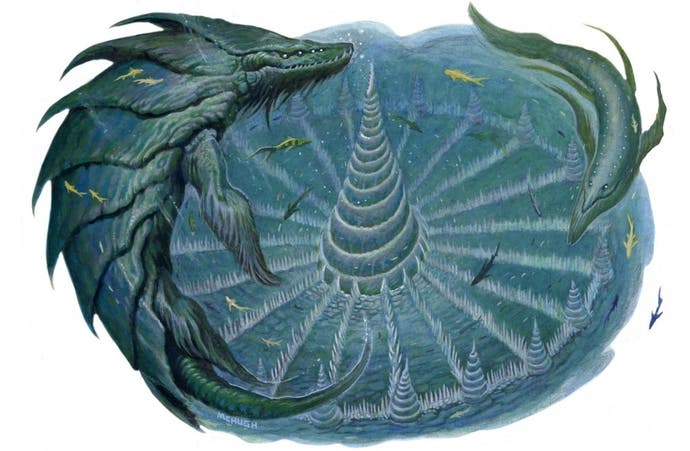
Meanwhile, over on Reddit, Colin McComb, Monte Cook, Brian Fargo and Kevin Saunders (the project director) have hosted an Ask Me Anything chat.
I've compiled some of the interesting tidbits that came from it.
Torment: Tides of Numenera won't award experience points for "simple combat". "You can choose to fight, but you won't be getting many rewards for it unless those fights are within the context of the narrative," said Colin McComb.
"The [pen and paper] rules for Numenera discourage monster grinding for XP. Instead, they focus on finding solutions for problems, for completing particular tasks, and for inventive, elegant answers. We plan to continue that."
McComb wants Torment Numenera to "promote thoughtful, careful play" but not without opportunities for "crazy, slapstick" gaming. Experience will be dished out for "successful non-combat resolutions with antagonists" as well as for finding secrets and unlocking discoveries.
"We want each combat encounter to be narratively satisfying," he added, "we want combat itself to be an entertaining (instead off frustrating) experience, and we want to find non-combat solutions for every puzzle - that is, we want to make sure that combat is avoidable and that you'll be able to play through the game as a pacifist."
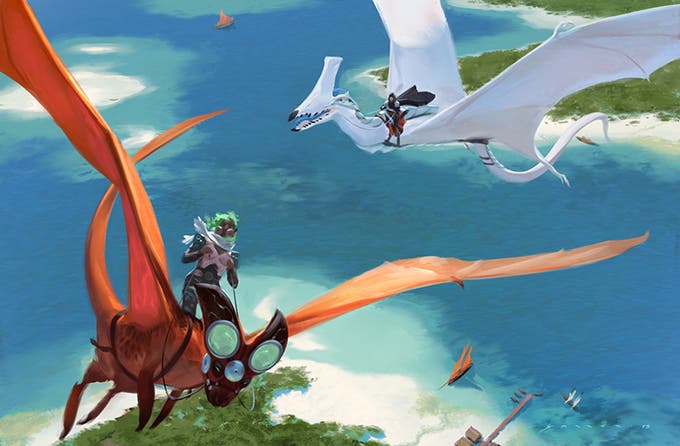
Character development relies on three statistic pools and, intriguingly, "you build your character with a sentence". "I am an adjective noun who verbs (or descriptor, type, and focus)," was the formula McComb shared. "For instance: I am a charming glaive who speaks with the dead. Each descriptor, type, and focus modifies the pools."
Torment Numenera is being designed as a more mature and philosophical beast than a typical blockbuster RPG. Tonally it aligns with Planescape: Torment, which was a wordy beast - there were something like 500,000 words in it, according to Kevin Saunders. "We don't have a specific target word-count for Torment," he said, "but we expect to be in the same ballpark as PST in total scope."
How similar otherwise will Torment Numenera be to Planescape: Torment? Well Planescape and Numenera are completely different settings and even RPG systems - Planescape belonging to Dungeons & Dragons.
"The biggest difference," expanded Numenera creator Monte Cook, "is this: belief versus action. In Planescape, belief shaped the planes. The factions, deities, and everything else were all about belief. Numenera is much more about action. I don't mean like Bruce Willis action (although there's plenty of action movie action too). I mean what you do.
"In Numenera, characters have all these amazing artifacts and discoveries of the past all around them. But the remnants of the past also make their world extraordinarily dangerous and difficult as well. So really, the game is about what you do with what you have to try to shape the world. In other words, even though you've got all this history, it's really about the present, and shaping the future. There's a lot of choice involved there, and a lot of direct interactivity.
"In Planescape, the world was what you believed it to be. In Numenera, the world is what you make it."
"In Planescape, the world was what you believed it to be. In Numenera, the world is what you make it."
Monte Cook
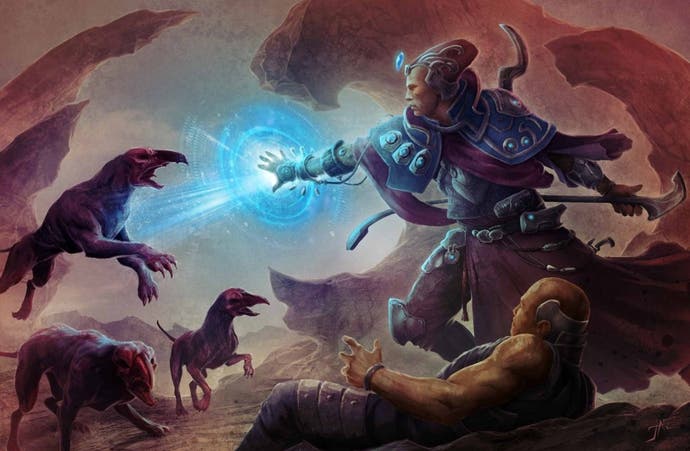
The mature RPGs of the blockbuster gaming world - The Witchers, the Dragon Ages, the Mass Effects - have all made a headline or two for their sexual encounters. Torment Numenera won't have physical sexual encounters. But love, oh love, will be explored deeply.
"While we have ruled out physical relationships in Torment, we do intend to leave the question of exploring relationships open, and we're going to do that without regard for gender or race," said McComb. "The Ninth World is a billion years in the future, and humanity has changed in that time. We'll present what we consider alternative relationships today in a simple, matter-of-fact format, and that's because that's what those relationships should be. We don't want to 'earn points' for this - we want to present a logical, coherent world."
Kevin Saunders added: "What relationships develop will arise organically through the writers developing the characters in believable ways. Given this emphasis on the narrative, and what we're envisioning thus far for our characters, it seems unlikely that sexual encounters will find an appropriate place in the story.
"That said, love is very relevant to the theme of one's legacy. How many of us are motivated by love, do things for love? And look at all of the kinds of love there are. So love is certainly a concept that we will explore - though how much of it you encounter during your play through will depend upon the choices you make. (Because for some, love plays only a peripheral role.)
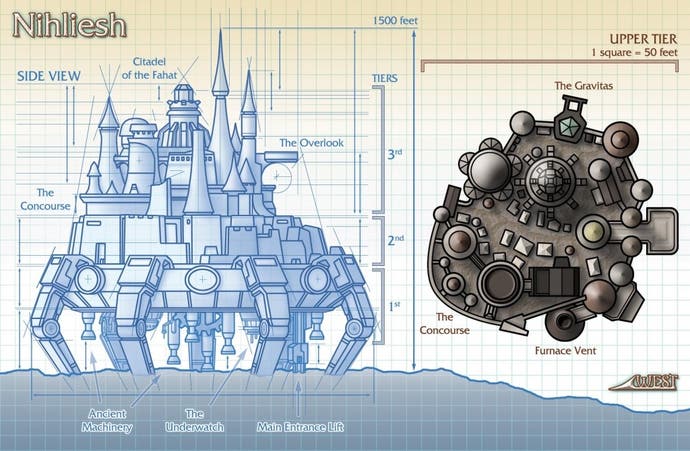
"The theme of abandonment (and mystery, for that matter) is also very relevant to love. So we will explore relationships, but only so far as they naturally develop given our themes and characters."
Torment: Tides of Numemera will be built using Unity. But whether it will be pre-rendered 2D, or 3D, isn't decided. Pre-rendering is "a popular request", said Fargo, who also mentioned that Torment Numenera "gives the impression of a more painterly style" and that the team is experimenting with that.
If Torment does go pre-rendered 2D, Kevin Saunders said that would keep the system specs required to run the game "very low".
Oh, and because I can't resist, here's a little endnote detailing how the Torment: Tides of Numenera project came to be.
Wrote Colin McComb: "It actually started with a PST retrospective on Eurogamer. Bertie Purchese asked some PST team members to be on the show for a podcast, and we spent some time reminiscing.
"When it concluded, I told Mr. Avellone that he should tell Brian that I would totally be available for writing WL2. Brian apparently liked my work on that enough that he thought I'd be a good bet to lead a new Torment creatively. At the same time, Chris introduced Kevin to Brian, and I (being a total prima donna ;)) insisted that Adam Heine be on the team because Adam said he would love to do it.
"Then it was just a matter of getting Numenera licensed, and here we are."
I did a good thing!
